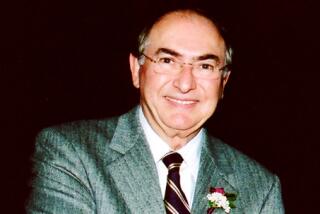Webster Hubbell’s Deals With 2 Phone Firms Spark Questions
- Share via
WASHINGTON — Officials at Pacific Telesis Group acknowledge that they were unaware former Associate Atty. Gen. Webster L. Hubbell, one of the firm’s private advisors in the high-stakes battle over massive telecommunications legislation in 1994, worked at the same time for a competing telephone company.
Hubbell’s simultaneous consulting deals with Pacific Telesis, which provides local phone service in California and Nevada, and Sprint Corp., a long-distance carrier, raise a thicket of ethical and legal issues, according to interviews with Washington lobbyists and experts.
Did Hubbell, as a lawyer, follow American Bar Assn. rules requiring disclosure of potential conflicts of interest to clients? Was he actively working both sides of the telecommunications bill? Did he share any strategic information about one company with the other?
“Lawyers are not allowed to represent clients whose interests would come into conflict with one another,” said Erwin Chemerinsky, who teaches legal ethics at USC. “Assuming that representing Client A would be to the detriment of Client B, the lawyer would have to disclose it to both clients and get their consent.”
Otherwise, Chemerinsky said, the lawyer could be sued by an aggrieved client or disciplined by the bar association.
The Times has reported that Hubbell, a close friend of President Clinton and former law partner of First Lady Hillary Rodham Clinton, landed deals with Sprint and Pacific Telesis between April 1994, when he resigned his Justice Department post, and December 1994, when he pleaded guilty to fraud and tax-evasion charges.
During that same period, Hubbell had at least 10 paid arrangements--some of them through the efforts of the president’s friends and closest supporters. The income from these deals easily surpassed the $123,100 salary Hubbell was paid as the No. 3 official at the Justice Department. Republicans have questioned whether friends of the first family helped provide Hubbell “hush money” as investigators were probing Hillary Clinton’s dealings with a failed Arkansas saving and loan.
At Pacific Telesis, high-ranking employees said they never saw Hubbell in the Washington office during the 10 months he received a monthly retainer from the company.
Said one person affiliated with Pacific Telesis during the telecommunications battle: “If we had known that Web Hubbell had been hired by Sprint, . . . no way we would have touched him.”
Participants in the telecommunications lobbying war expressed surprise that Hubbell had worked at the same time for a pair of fiercely competitive firms in the same industry.
“I cannot remember any case like this,” said Andrew Barrett, a former commissioner of the Federal Communications Commission and a Republican. “It is extremely unusual. It’s almost like representing both sides in a divorce case.”
“For the life of me, I can’t imagine how you could lobby for both sides at the same time,” said Brian Moir, a Washington communications lawyer who represented long-distance users during the legislative battle.
People knowledgeable about Pacific Telesis said the California-based company is particularly sensitive about any adverse publicity stemming from its previous employment of Hubbell while the firm’s proposed merger with SBC Corp. is pending before California’s Public Utilities Commission.
Spokesman Bill Brittingham said Friday that Pacific Telesis officials in Washington had no idea that Hubbell had gone to work for Sprint while he was employed by Pacific Telesis from July 1994 to May 1995--six months after he pleaded guilty to the federal charges. He said the firm would have no further comment on whether Hubbell’s arrangement posed a conflict of interest.
Sprint officials declined to comment on whether they knew of Hubbell’s employment with Pacific Telesis at the time the firm hired him in late 1994. The company also refused to disclose the dates of Hubbell’s employment, the type of work he performed or his involvement in the telecommunications legislation.
“We retained Hubbell in late 1994 and terminated him that December, as soon as we learned of his plea bargain,” said Eileen Doherty, a spokeswoman in Sprint’s Washington office. “If people want to draw inferences, there is nothing we can do about that.”
He was hired solely as a consultant, to perform tasks not then being undertaken by others at the company, she said.
Hubbell pleaded guilty to separate fraud and tax-evasion charges related to his bilking his former law partners and clients at the Rose Law Firm in Little Rock, Ark., out of $482,410. He was released recently, after serving a 16-month term in a federal prison.
The hiring of Hubbell came at a critical juncture for the telephone giants and their lobbying campaigns to influence a massive bill, enacted in February of last year, to deregulate the telecommunications industry.
One of the bill’s most contested provisions was an amendment that would grant the Justice Department’s antitrust division a strong oversight role in approving future providers of long-distance service. Sprint, AT&T; Corp., MCI Communications Corp. and other long-distance carriers supported the Justice Department provision, while the seven regional Bell companies vigorously opposed it.
Company officials said Hubbell served as an advisor who was available to Pacific Telesis to develop strategic planning on the telecommunications bill. He was consulted “on an as-needed basis by telephone,” Brittingham said.
Pacific Telesis officials said Hubbell engaged in no lobbying on the telecommunications bill. As a former associate attorney general, Hubbell is prohibited from lobbying the Justice Department for up to five years under federal statutes and ethics guidelines adopted by the Clinton administration.
Times staff writer David Willman contributed to this story.
More to Read
Inside the business of entertainment
The Wide Shot brings you news, analysis and insights on everything from streaming wars to production — and what it all means for the future.
You may occasionally receive promotional content from the Los Angeles Times.









